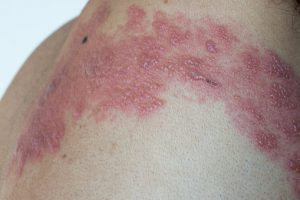 The shingles vaccine may remain effective after chemotherapy in the elderly. Study author Hung Fu Tseng said, “The zoster vaccine has been shown to be safe and effective in elderly adults with healthy immune systems, but until now, there has been a lack of data on whether the vaccine remains safe and effective for individuals who might have compromised immune systems resulting from treatments like chemotherapy. Our study demonstrates that older patients who had previously been vaccinated against shingles have a lower chance of developing this painful and often debilitating disease after chemotherapy.”
The shingles vaccine may remain effective after chemotherapy in the elderly. Study author Hung Fu Tseng said, “The zoster vaccine has been shown to be safe and effective in elderly adults with healthy immune systems, but until now, there has been a lack of data on whether the vaccine remains safe and effective for individuals who might have compromised immune systems resulting from treatments like chemotherapy. Our study demonstrates that older patients who had previously been vaccinated against shingles have a lower chance of developing this painful and often debilitating disease after chemotherapy.”
The researchers looked at medical records of over 21,000 people over the age of 60 who underwent chemotherapy. The researchers found that those who previously received a shingles vaccine had a 42 percent lower risk of shingles after chemotherapy, compared to those who were never vaccinated.
Advertisement
Also, patients who were vaccinated did not require hospitalization for shingles, compared to six unvaccinated patients.
Shingles used to be a common occurrence among the elderly until the vaccine was developed. The CDC recommends anyone over the age of 60 get vaccinated for shingles in order to reduce their risk and complications associated with shingles.
Tseng concluded, “Age is associated with increased risk of cancers and other medical conditions that may require immunocompromising treatments such as chemotherapy. It is important that elderly patients get vaccinated when they are relatively healthy, or before starting immuno-compromising treatments, because the vaccine isn’t advised for those who have weakened immune systems.”
Shingles in cancer patients
Anyone can develop shingles as it is the reactivation of the chickenpox virus later in life. It is believed to become reactivated if a person’s immune system becomes compromised or weakened. Shingles results in a painful rash, which can leave scars, normally found on one side of the body.
Patients with certain types of cancer are at a higher risk of shingles as the cancer directly affects a person’s immune system. In some cases, shingles may emerge prior to the cancer diagnosis as a diagnostic symptom. This is why it’s so important to uncover the underlying cause of shingles. Nearly five percent of shingles patients have an undiagnosed form of cancer that would have continued to go undetected if they didn’t develop shingles.
Although shingles is generally harmless, it can spread to internal organs if left untreated. At the first sign of shingles, speak to your doctor right away to begin treatment in order to prevent any related complications. Furthermore, if you’re over the age of 60, get vaccinated to reduce your risk.
Related Reading:
Shingles raises short-term stroke and myocardial infarction risk in elderly
Shingles raises short-term stroke and myocardial infarction risk in elderly. The findings published in the Mayo Clinic Proceedings found that seniors over the age of 50 have a 50 percent higher risk of stroke up to 90 days after a shingles episode. One-third of the 95 percent of individuals with the chickenpox virus will develop shingles. Continue reading…
Advertisement
Shingles (herpes zoster) eye infection may cause blurry vision, swollen eyelids
Herpes zoster, which is commonly known as shingles, causes painful blisters near the nerves on one side of your body, but what many people don’t realize is that it can also cause damage to your eyes, including eye infection, blurry vision, and swollen eyelids. Continue reading…
Sources:
http://www.mesotheliomaweb.org/shingles.htm
http://consumer.healthday.com/cancer-information-5/mis-cancer-news-102/shingles-vaccine-still-effective-after-chemotherapy-690510.html
